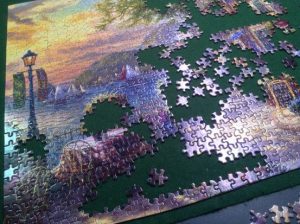
Once we get into colder weather, puzzling is one of my favourite indoor activities. The green felt puzzle mat comes out and the entire ping pong table is commandeered to spread out the 1000 pieces for easier sorting. It’s helpful to leave this project in the basement where it can act as kind of a default activity. And I’ve learned a few things since taking this up a few years ago.
First, it’s better to work for short periods of time. Somehow, stepping away and coming back with fresh eyes works wonders. Where just hours before, the search became frustrating, now the pieces appear. In fact, sometimes it feels as if it’s an unconscious knowing that guides your fingers. In a kind of incubation process, my brain takes in the visual information and continues to work. It just needs time. On one occasion when I pointed to a couple of places that needed what I thought were easily identifiable pieces, and implored “why can’t I find these?” they showed up within minutes. Discovering this made me feel a whole new respect for brain potential. And the feeling, perhaps, that I just need to be a little more specific when I ask for things. Maybe formulating the right questions is effective when looking for results!
Secondly, sorting by shape, and colour recognition sharpen the ability to recognize patterns. I was brought up in a culture that greatly valued work and production. The benefits of play weren’t as easy to quantify. My father was in his eighties when my sister tried to encourage a puzzling activity that would have been good for improving his dexterity and co-ordination. He called it “a waste of my valuable time.” This was said with a smirk, because his time as he recuperated from surgery wasn’t really being spent doing anything else, and he knew it.
Third, persevering when progress on a puzzle is slow is an exercise in learning patience. I’ve learned that giving up doesn’t mean for always. Just because something is not possible now, it doesn’t mean it will be impossible forever. Just because I don’t see a picture emerging in my circumstances right now, it doesn’t mean that the pieces won’t someday fall into place. And it’s very satisfying to stick around long enough to see that happen both when I play at puzzling, and in the slower processes of life.